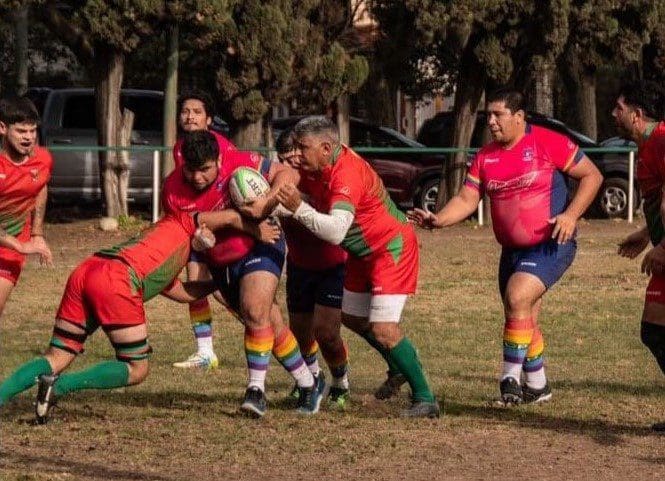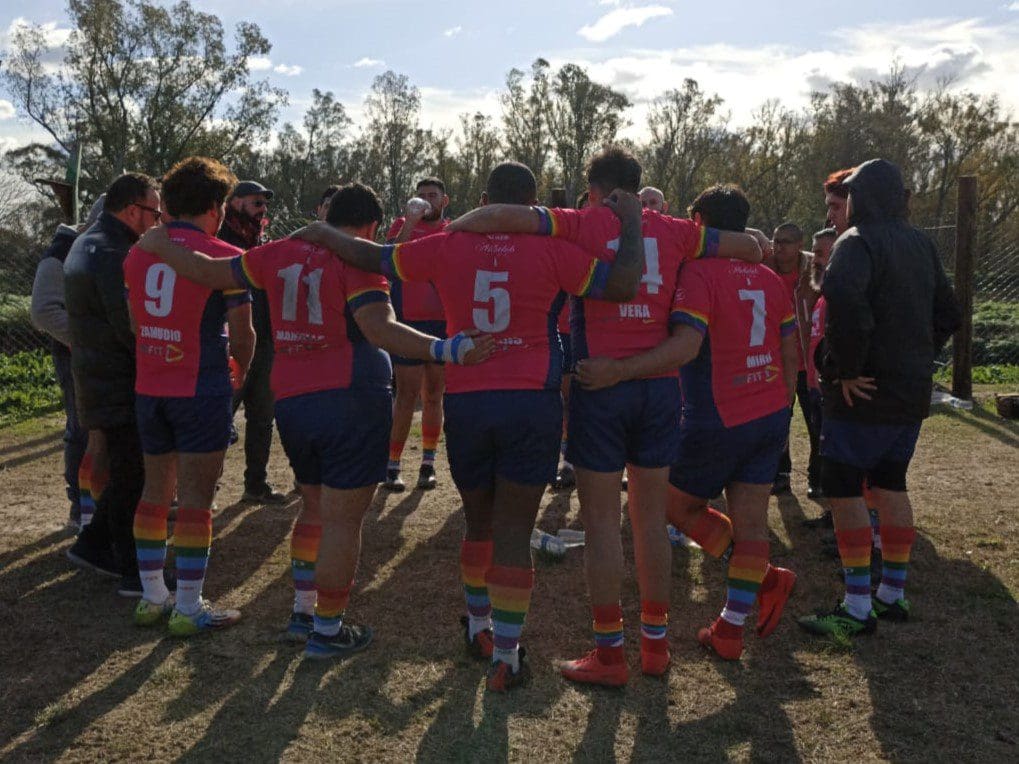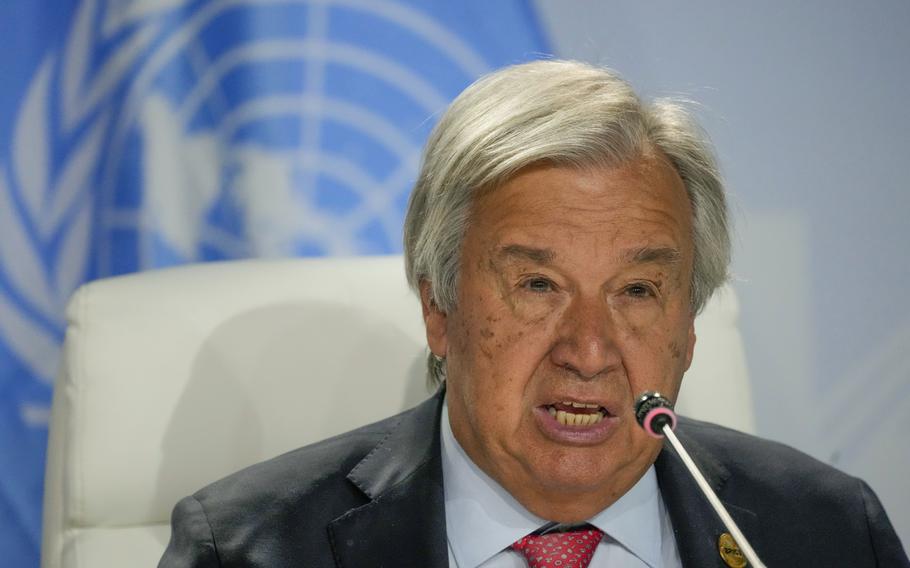Spain Has Condemned Inappropriate World Cup Kiss. Can It Now Reckon With Sexism in Soccer?
Despite Rubiales' insistence he did nothing wrong, many saw his act as a sexist abuse of power that was no longer tolerable.

MADRID (AP) — When Patricia Otero watched the president of Spain’s soccer federation tarnish the greatest victory in the history of women's sports in Spain by forcibly kissing a player on the lips during the Women’s World Cup medal ceremony, she was saddened — but not surprised.
For this amateur soccer player, the kiss that Luis Rubiales pressed on Spain forward Jenni Hermoso was simply the most public and notorious example of the treatment she and her teammates received as girls and young women.
“We have seen that all our lives,” the 30-year-old told The Associated Press from the southern city of Malaga, where she still plays soccer when not teaching high school. And when Rubiales tried to justify the kiss by saying it was like one he would have “given my daughters,” it sounded eerily familiar.
“I had a coach who would pat our butts, and always while acting friendly, saying, ‘You are like a daughter to me.’ And that was when you are still not adult enough to know what he is doing,” she said. “You think it is normal.”
While women still struggle for equality in Spanish soccer — Otero recalled how her team had to sell raffle tickets to play and clean their own locker rooms while boys did neither — the reaction, in Spain and beyond, to the globally televised kiss has been widespread condemnation.
Hermoso says it was not consensual, and despite claims to the contrary by Rubiales, public opinion is behind the 33-year-old player. The only continuing public support for Rubiales, 46, has come from his mother, who staged a short-lived hunger strike in protest of her son’s downfall before ending it Wednesday.
Even as the conduct of the most powerful man in Spanish soccer robbed global attention from the new world champions, Spain is taking steps to turn the crisis into a reckoning into the sexism that exists in the sport in a country where strides in other areas have placed it in the European vanguard of female gender equality.
Despite Rubiales' insistence he did nothing wrong, Spain’s government, its players' unions, soccer clubs, fans and most importantly, Hermoso and her teammates, saw his act as a sexist abuse of power that was no longer tolerable. FIFA, the world soccer governing body, suspended Rubiales for 90 days, and Spain’s government is moving to have him declared unfit to hold the post.
The condemnation of Rubiales, who also grabbed his crotch in a lewd victory gesture within sight of Spain's Queen Letizia and teenage daughter, Princess Sofía, following Spain’s victory in the Aug. 20 final, has spread beyond the government and the powers-that-be in soccer.
Fans at men’s games last weekend in the hugely popular La Liga chanted for Rubiales to go, while hundreds rallied in downtown Madrid in support of Hermoso.
Rubiales had the chance to step down on Friday. Instead, he delivered a tirade to his federation members, claiming to be the victim of a witch hunt by “false feminists.”
While sexism has historically run deep in Spain, Rubiales has found himself out of step with the country’s rapidly changing social mores.Women’s rights activism has been gaining ground for decades, but was supercharged in 2018 following a high-profile case of gang rape viewed as Spain’s “Me Too” moment.
Since then, laws have been passed protecting women’s right to abortion and promoting equality in the workplace. A law that defines sexual consent is seen as among the most ambitious in Europe.
In AP interviews with women in soccer and beyond, there was a consensus that an act like the one committed by Rubiales even 10 years ago would have been largely ignored.
Marisa Soleto, president of the feminist Women’s Foundation, said the country has undergone a seismic shift in recent years.
“What this shows is that ... Spanish society understands that you don’t have to hit a woman for a non-consensual act to be violent,” Soleto said of the kiss that has brought so much outrage.
The groundswell of support for Hermoso has found its slogan in “Se Acabo” — Spanish for “this is over" — started by Hermoso’s teammate and star player Alexia Putellas. It has since become a rallying call against Rubiales, even worn on T-shirts by Sevilla’s men’s players.
Lisa Banks, a Washington-based civil rights and employment attorney, said the Rubiales kiss was a “learning moment ... for men in power, for men in sports, that an assault is an assault, even if it happens in a moment of jubilation."
While Rubiales has succeeded in aligning nearly the entire Spanish political spectrum against him, there were some initial holdouts among the soccer leadership.
Rubiales' adamant refusal to step down — and claim he was the victim of a feminist smear campaign — was greeted last week by loud applause from the soccer federation's general assembly, whose 140 members include just six women. Spain’s women’s coach, Jorge Vilda, and men’s coach, Luis de la Fuente, were among those clapping.
But after FIFA suspended Rubiales, his last supporters abandoned him, and the regional federation heads are now demanding he resign.This week, prosecutors opened a preliminary investigation into whether the kiss was a sexual aggression offense, and the national women's soccer team has announced it won't play if Rubiales stays on.
For Beatriz Álvarez, the president of Spain’s professional women’s league, there is more behind Rubiales’ demise than "a war of the sexes or feminism.”
“The so-called ‘little peck’ ... is a kiss by a boss to a worker. He grabbed her head and gave her a kiss," Álvarez said.
"At that moment, Luis Rubiales was the federation president and had absolute authority over her.”
Hermoso has called the kiss and Rubiales' refusal to accept her insistence it wasn't consensual “the final straw."
“What everyone has been able to witness on live television during the celebration also comes with attitudes,” she said, "that have been part of our team’s daily life for years.”
Spain’s women players had to go to the extreme of rebelling against the federation last September to improve conditions for the team. Fifteen players said they would not continue to play for coach Vilda unless things changed, including what one female former assistant coach described as “treating the players like they were 12-year-olds.” The federation backed Vilda and only three returned to the World Cup squad.
There is some hope that the response to the kiss scandal will have a cascade effect in improving long-ingrained inequities in soccer, where the minimum salary for men in the first division is 182,000 euros ($197,000) but for women, just 16,000 euros ($17,400).
Pilar Calvo of Spain’s Association of Women in Professional Sports said her group has seen the number of complaints filed increase five-fold over the past week.
“We have seen all types (of complaints) over inequalities," she said, "from people who feel overlooked for sports scholarships, to complaints over when women can use sporting facilities, to inequality in prize money.”
Now all eyes are on the federation, to see if Rubiales can be definitively barred from returning and whoever takes his place can instill a new culture.
Toña Is, a player-turned-coach, led Spain’s women to the under-17 world title in 2018, and was an assistant coach for Vilda on the national team until she was fired by the federation in 2020. Now a policewoman in northern Spain, she said she was let go because of her internal complaints about sexism and other inappropriate behavior.
Now she feels vindicated.
“Time has finally shown that we were right, that there have been inappropriate episodes inside the federation for years,” she said.
“We must have zero tolerance for these types of sexist attitudes, not just in sports, but in society at large so that we don’t go through this again.”
___
By TERESA MEDRANO and JOSEPH WILSON
Spanish Women Players Spotlight Crisis of Abuse
All Players Deserve Harassment-Free Work Environment
Macarena Sáez
Executive Director, Women's Rights Division
Minky Worden
Director of Global Initiatives

Spanish football federation president, Luis Rubiales talks to Queen Letizia of Spain on stage during the FIFA Women's World Cup Australia & New Zealand 2023 Final match between Spain and England at Stadium Australia on August 20, 2023 in Sydney, Australia. © 2023 Cameron Spencer/Getty Images
When Spanish Football Federation President Luis Rubiales refused to step down after kissing Spanish football player and 2023 World Cup champion Jenni Hermoso without her consent, he instead justified his actions. In a speech to the general assembly of the Spanish Football Federation, Rubiales centered himself as the victim, blamed “false feminism” for committing a “social assassination” against him, and shouted five times: “I will not resign!”
Rubiales’ obliviousness to sexual abuse and workplace harassment should finally force FIFA, football’s governing body, to do what it has long failed to do: address the culture of sexual violence and gender discrimination in women’s football.
Shockingly, there are sexual abuse complaints against at least twenty of FIFA’s 211 national federations.
Beyond Rubiales’ personal responsibility for his actions, FIFA, and all football associations have an institutional responsibility to stop violence and harassment of women players. It took FIFA almost a week to suspend Rubiales for 90 days. In the meantime, the Spanish Football Federation pressured Hermoso to back Rubiales, and when she denied the kiss was consensual, the federation threatened her with legal actions.
It is not uncommon for institutions to only blame the person committing the offense, who, when “caught,” is forced by public pressure to resign – a personal reputation management move. But then larger structural issues allowing for abuse remain and institutions keep working as usual, with no good mechanisms in place, and no systemic harms prevention and reparation approaches.
Women football players around the world have had enough and are furiously pushing for change. All players deserve the right to play football without concerns for safety in the workplace. They have the right to compete with the same economic conditions enjoyed by male football players. They have the right to have more female coaches and federation leaders. They have the right to play football without having to make a statement about their rights after every game.
The Rubiales case should focus the football leadership in Spain, Europe, and internationally on the need for long-overdue reforms to protect and respect women players. Implementation of such reforms should be a key consideration for FIFA when deciding the location of key events including the Women’s and Men’s World Cups. Above all, it should hasten FIFA’s reforms to protect women, including by setting up an independent Safe Sport Entity, to report and investigate abuse, protect survivors, and get abusers at all levels out of sport.
I spoke up against the Spanish federation in 2015 and never played for the national team again. Now we need real change
Wed 30 Aug 2023
The situation in Spain with Luis Rubiales is hard to explain to an international audience because this is something historical and cultural in our country. In the 1970s women couldn’t play sport and that was the mentality we had in this country. From then until now, has a lot changed? Yes, but not as much as it should have because there are still a lot of people who have a sexist mindset.
Within sport, specifically football in this case, there are still a lot of sexist people. Most of the leaders within Spanish football are men and they are men from a certain generation with defined mindsets. What people outside Spain need to understand is that this problem goes much deeper. We are talking about a football federation but could be talking about any other federation or any other company.
What happened with Rubiales and Jenni Hermoso has had so much attention because it’s around football, around a World Cup final and with an indisputable action. It has gone global because of how it happened, the moment it happened and the importance it has had. But what if this hadn’t happened, if Rubiales hadn’t kissed Hermoso? We would be talking about how Rubiales is the best football federation president in the world, that Jorge Vilda is the best manager in Europe and the world and everything would continue as normal. We have hit a threshold and are at war to get change.
How did Spain win the World Cup under these circumstances? In Spain, we’ve always had talent. That talent couldn’t shine before, but now it does because clubs are more professional, the players are more professional, conditions are improved and that at least allows you to compete evenly. Before we couldn’t and now we can.
We have a generation of fantastic footballers. It is not only those 23 players who were at the World Cup but those who stayed home and others who have never been called up. In the past few years, proper infrastructure has been facilitated and the players arrived at the World Cup able to compete. All those talents that are being formed at clubs are at an elite level, independently of who is the manager of the national team. Imagine if things had been done correctly and if we had had adequate leaders a long time ago. We would have been world champions 10 or 15 years earlier.
The problem is not the steps that need to be taken, it’s the ones that are going to be taken. I would like to see things done in a certain way, but I don’t know whether it’s possible or if whoever has the power will do them. But the message from Spanish society is clear. Now it’s the turn of the government, politicians, and corresponding organisations to act. It’s external people that must decide what will happen now and how will we change this.
The footballers and Spanish society have already said what the problem is, we have all seen it and there are no more secrets. People who are in certain positions cannot say: “I didn’t know about it.” Now everyone knows about it. The situation depends on those people who are there to work on doing things the right way. Are they going to remove Rubiales and put someone else similar in? Or will they carry out a structural reform, which is what should be done.

The problem is not if Rubiales leaves or is fired – it is deeper than that. It’s something that we’ve been living and suffering for a long time. It was already the case when I played and it’s still the case with Rubiales, but it’s also all the people who work at the federation.
We saw it in the 30 minutes he spoke last week, where most people were applauding, smiling and positioning themselves in his favour. What we witnessed publicly is what some of us have seen and said privately over many years – well, since for ever really.
When Rubiales spoke in that press conference and said what he did, it seemed surreal. It was embarrassing and shameful. In that moment he allowed the frustration and deception to turn into anger. That is where all the reactions are coming from and that’s when we said, “that’s it, it’s over”.
Veró Boquete won 62 caps for Spain but was not picked again after the 2015 player revolt against the federation. She plays for Fiorentina in Serie A. She was talking to Alex Ibaceta.




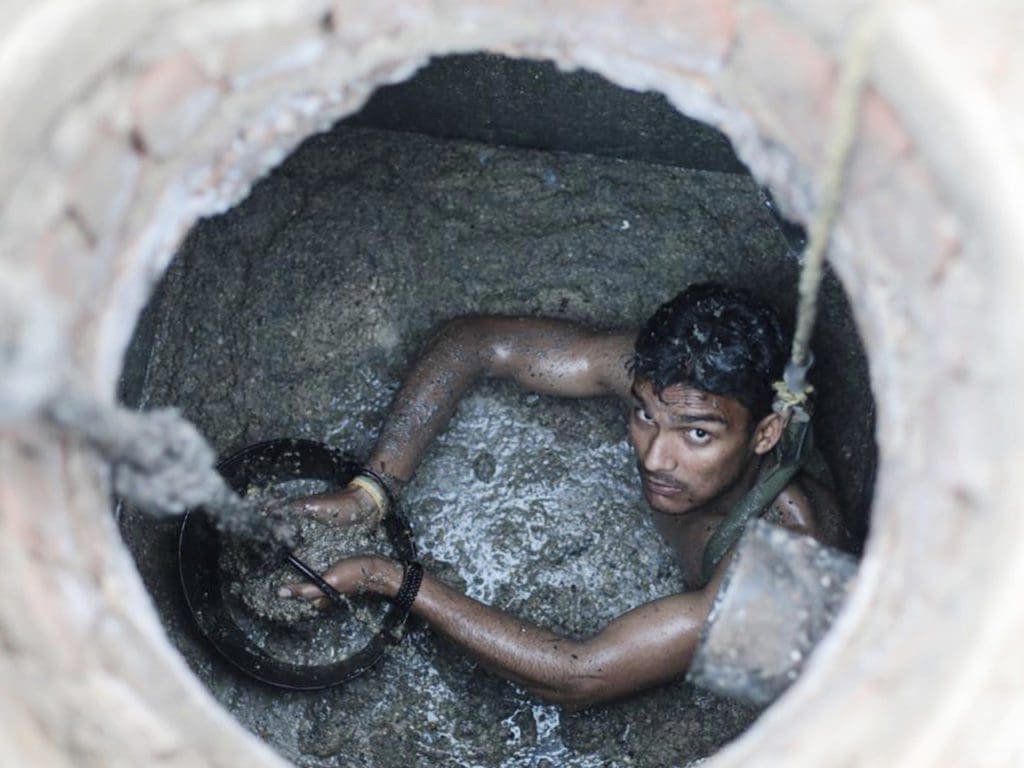


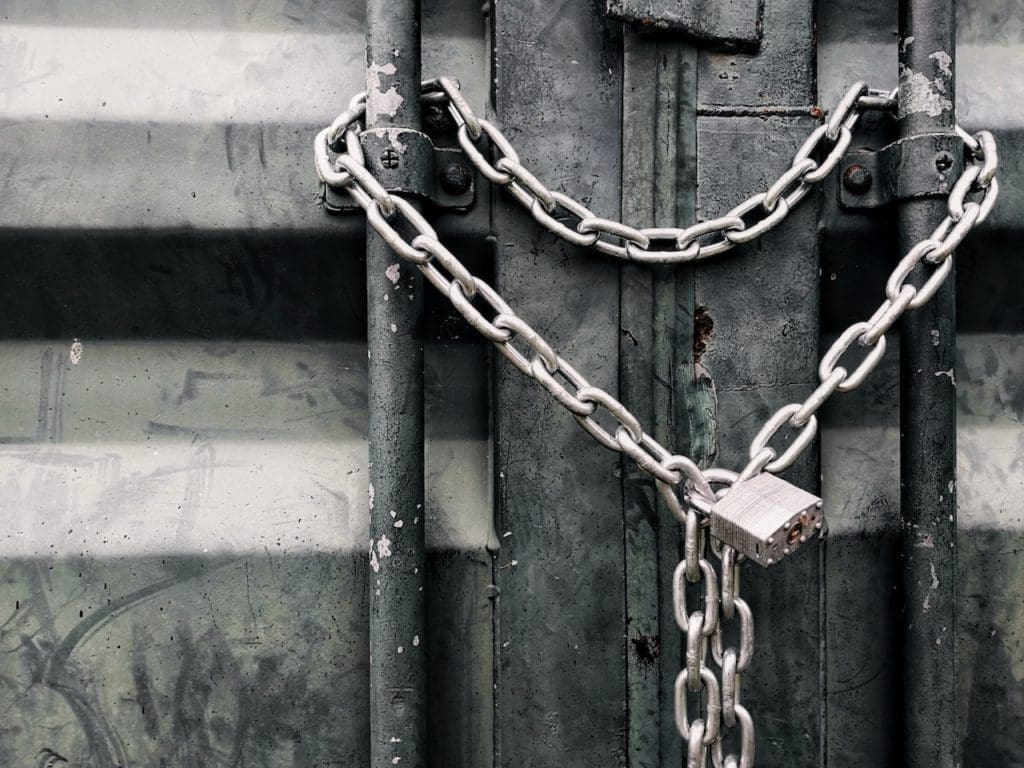

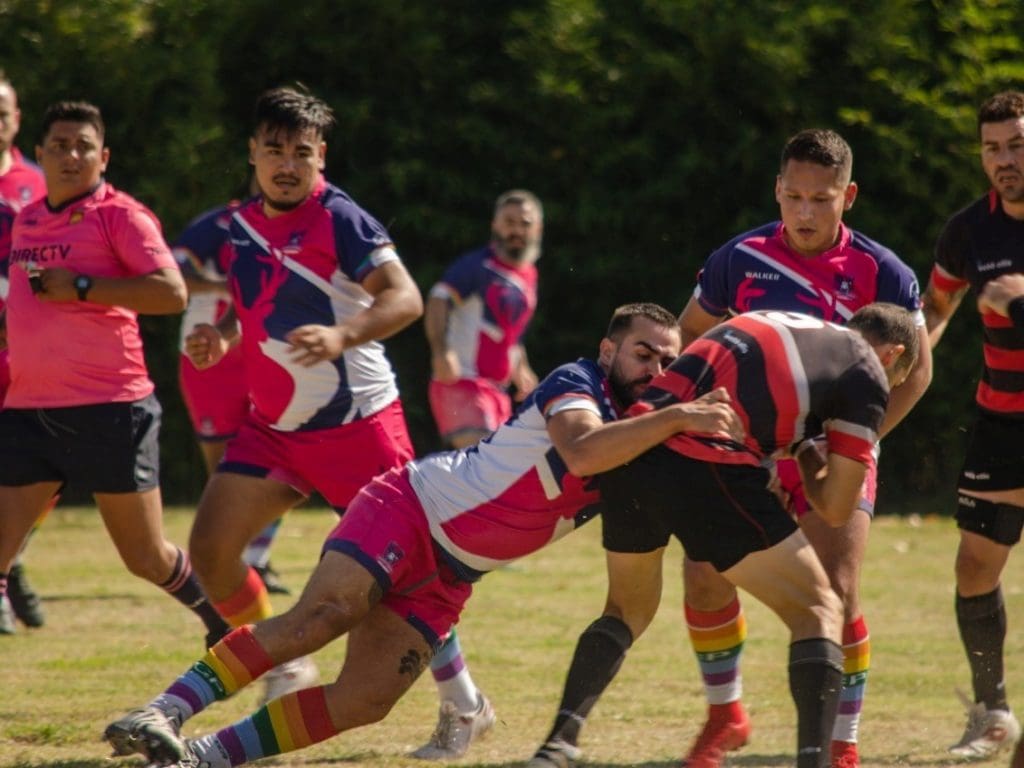 Members of Ciervos Pampas compete in their rainbow socks in rugby tournaments in Latin America. | Photo courtesy of Ciervos Pampas
Members of Ciervos Pampas compete in their rainbow socks in rugby tournaments in Latin America. | Photo courtesy of Ciervos Pampas
